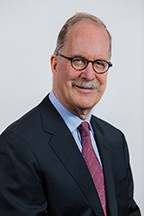Language. It’s a touchy subject here in Canada, despite our official status as a bilingual country. And even after years of referendums, protests and elections fraught with opposing ideologies, it can still be a challenge to ensure that all citizens have access to services in their chosen tongue. For outgoing Commissioner of Official Languages Graham Fraser, this challenge has proven one of most rewarding of his long career.
Or perhaps that should be ‘careers.’ Though Fraser enjoyed a few successful decades as a political journalist prior to the appointment as Commissioner, his first major post-secondary job involved matters of a far less current nature.
“I worked on an archaeological dig at Fort Lennox,” says Fraser, who arrived at the Île aux Noix site on Richelieu River armed only with his high school French. He quickly learned that studying a language and existing within it can be very different things.
“I can remember when the phone range I would shrink away from the call,” he says. “At one point there was a fellow student on the dig, who was herself totally bilingual, who said to me ‘You’re very different in French than in English.’ Well of course I’m different. I’m stupid, inarticulate and have no sense of humour [in French].”
That summer proved a fertile learning ground for Fraser, whose grasp of the language became surer as the weeks went by: first a point when he could have a proper conversation with one person, taking careful note of their face and body language. Then two people, and finally a level of comfort attending a cocktail party with many voices vying for attention. Fraser likens it to a newcomer’s experience upon arriving in a foreign land.
“Someone comes to a new country and they are captive in a way,” he says. “That summer of not only discovering a major part of my own country also made me more sensitive to the immigrant experience.”
It also made him realize that his talents might be better applied to the art of uncovering the present day truths instead of the distant past. Upon graduating from the University of Toronto, Fraser embarked on a writing career has seen him covering politics for The Toronto Star, The Globe and Mail and Maclean’s, while his well-received books examined everything from urban renewal to the delicate dance between our country’s two languages.
“At the time of the Meech Lake debate I wrote an outline for a book about the culture conflict between French and English in Quebec. As part of the research for that book I read, if not every report by every Commissioner of Official Languages, then certainly most of them. At one point I thought, you know, maybe I could do this.”
And do it he has, for the last ten years. Working first under former Prime Minister Stephen Harper – who later extended the normally seven year tenure by three years – Fraser has continued in the position that he wryly describes as “part cheerleader, part nag. And I used that to describe the job when I applied.”
It’s an apt characterization. As Commissioner, Fraser is tasked with not only upholding and overseeing implementation of the Official Languages Act, but also helping to encourage federal institutions to craft strategies of their own in providing services in both languages. In this, tact and diplomacy are very necessary qualities to employ.
“What I decided fairly early on in my mandate is that if I simply beat the government over the head every opportunity I had, ministers and deputy ministers would shrug and pay no attention,” Fraser says. “On the other hand, if I was too tolerant when federal institutions didn’t meet their responsibilities then I would lose the confidence of parliamentarians and the communities.
“If there’s a program that’s introduced the government needs to know if it’s going to have a positive or negative effect on minority language communities, [and there] should be an ongoing basis consulting with minority language communities in terms of what their needs are.”
As Fraser begins to wind down his tenure as Commissioner, his reflection on the past decade is largely one of satisfaction. He credits his exemplary team in helping him act as both diplomat and ombudsman, in negotiations, court cases and even some unexpected circumstances, like the efforts to have the Olympic Games broadcast in French across the country.
“CTV had been trying to reach an agreement to broadcast the games in French,” Fraser recalls. “A few days before the game someone I knew at CTV phoned and said we just can’t do it.
“The networks were not on speaking terms with the cable companies, so as a neutral party I was able to pick up the phone and make the proposal to the head of Rogers who was also a principal responsible for CPAC, the Parliamentary channel. This happened two days before the games opened.”
Thanks to Fraser interceding, the games were indeed broadcast nationwide in French – a last minute coup that exemplifies the need for out-of-the-box thinking when it comes to navigating the language divide.
And now retirement, at least from this particular arena. With five books already under his belt, Fraser is currently tossing around ideas on a sixth, while considering how best to devote his energies following his final day on October 16th of this year. Certainly he’ll be spending more time at his cottage in North Hatley, and, inevitably, upcoming projects will likely highlight his unique take on our country’s minority language communities, and the continuing need for bilingualism and co-operation.
“Our two official languages are part of the country’s identity,” says Fraser. “It’s something that defines us as a country, [and makes] us a more tolerant and understanding majority. It belongs to all of Canada, whether they speak the languages or not.”






